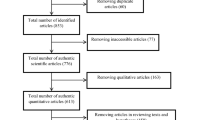Abstract
The current study examined the influence of trust in the appraisal system on ratees' reactions to performance evaluations. One-hundred and sixty eight bank tellers completed an instrument that assessed their trust in the appraisal system, appraisal satisfaction, perceived utility of evaluations, behavioral intention to improve performance, and intention to leave the job. Trust and performance evaluations were significant predictors of ratee reactions to appraisals and intention to improve on performance weaknesses. In addition, performance ratings were a better predictor of intention to improve on performance weaknesses for ratees who had high trust in the appraisal system. Implications for future research and practice are discussed.
Similar content being viewed by others
References
Angle, H.L., & Perry, J.L. (1981). An empirical assessment of organizational commitment and organizational effectiveness.Administrative Science Quarterly, 26, 1–14.
Bagozzi, R.P., & Yi, Y. (1990). Assessing method variance in multitrait-multimethod matrices: The case of self-reported affect and perceptions at work.Journal of Applied Psychology, 75, 547–560.
Bannister, B.D. (1986). Performance outcome feedback and attributional feedback: Interactive effects on recipient responses.Journal of Applied Psychology, 71, 203–210.
Bernardin, H.J. (1978). The development and use of the trust in the appraisal process survey (TAPS). Unpublished manuscript.
Bernardin, H.J., & Beatty, R.W. (1984).Performance appraisal: Assessing human behavior at work. Boston: Kent.
Bernardin, H.J., Orban, J.A., & Carlyle, J.H. (1981). Performance ratings as a function of trust in appraisal and rater individual differences.Proceedings of the Academy of Management, 311–315.
Cammann, C., Fichman, M., Jenkins, D., & Klesh, J. (1979). The Michigan Organizational Assessment Questionnaire. Unpublished manuscript. University of Michigan, Ann Arbor, Michigan.
Campbell, D.T., & Fiske, D.W. (1959). Convergent and discriminant validation by the multitrait-multimethod matrix.Psychological Bulletin, 56, 81–105.
Cohen, J., & Cohen, P. (1983).Applied multiple regression/correlation analysis for the behavioral sciences. Hillsdale, NJ: Lawrence Erlbaum.
Dobbins, G.H., Lane, I.M., & Steiner, D.D. (1988). A note on the role of laboratory methodologies in applied behavioral research: Don't throw out the baby with the bath water.Journal of Organizational Behavior, 9, 281–286.
Dipboye, R.L., & de Pontbriand, R. (1981). Correlates of employee reactions to performance appraisals and appraisal systems.Journal of Applied Psychology, 66, 248–251.
Dorfman, P.W., Stephan, W.G., & Loveland, J. (1986). Performance appraisal behaviors: supervisor perceptions and subordinate reactions.Personnel Psychology, 39, 579–597.
Feldman, J.M. (1981). Beyond attribution theory: Cognitive processes in performance appraisal.Journal of Applied Psychology, 66, 127–148.
Giles, W.F., & Mossholder, K.W. (1990). Employee reactions to contextual and session components of performance appraisal.Journal of Applied Psychology, 75, 371–377.
Greenberg, J. (1986). Determinants of perceived fairness of performance evaluations.Journal of Applied Psychology, 71, 340–342.
Greenberg, J. (1987). A taxonomy of organizational justice theories.Academy of Management Review, 12, 9–22.
Ilgen, D.R., Fisher, C.D., & Taylor, M.S. (1979). Consequences of individual feedback on behavior in organizations.Journal of Applied Psychology, 64, 349–371.
Ironson, G.H., Smith, P.C., Brannick, M.T., Gibson, W.M., & Paul, K.B. (1989). Construction of a Job in General Scale: A comparison of global, composite, and specific measures.Journal of Applied Psychology, 74, 193–200.
Landy, F.J., Barnes, J.L., & Murphy, K.R. (1978). Correlates of perceived fairness and accuracy of performance evaluation,Journal of Applied Psychology, 63, 751–754.
Lawler, E.E. (1967). The multitrait-multirater approach to measuring managerial job performance.Journal of Applied Psychology, 51, 369–381.
Locke, E.A. (Ed.). (1986).Generalizing from laboratory to field settings. D.C. Heath and Company, Lexington, Massachusetts.
Mook, D.G. (1983). In defense of external invalidity.American Psychologist, 38, 379–387.
Pearce, J.L., & Porter, L.W. (1986). Employee responses to formal performance appraisal feedback.Journal of Applied Psychology, 71, 211–218.
Podsakoff, P.M., & Schriesheim, C.A. (1985). Leader reward and punishment behavior: A methodological and substantive review. In B. Staw & L.L. Cummings (Eds.),Research in organizational behavior. San Francisco: Jossey-Bass.
Russell, J.S., & Goode, D.L. (1988). An analysis of managers' reactions to their own performance appraisal feedback.Journal of Applied Psychology, 73, 63–67.
Shore, C.M., & Newton, C.A. (1990). Job and organizational attitudes in relation to behavioral intentions.Journal of Organizational Behavior, 11, 57–67.
Spector, P.E. (1987). Method variance as an artifact in self-reported affect and perceptions at work: Myth or significant problem?Journal of Applied Psychology, 72, 438–443.
Stone, E.F., & Hollenbeck, J.R. (1984). Some issues associated with the use of moderated regression.Organizational behavior and Human Performance, 34, 195–213.
Author information
Authors and Affiliations
Rights and permissions
About this article
Cite this article
Dobbins, G.H., Platz, S.J. & Houston, J. Relationship between trust in appraisal and appraisal effectiveness: A field study. J Bus Psychol 7, 309–322 (1993). https://doi.org/10.1007/BF01015757
Issue Date:
DOI: https://doi.org/10.1007/BF01015757




